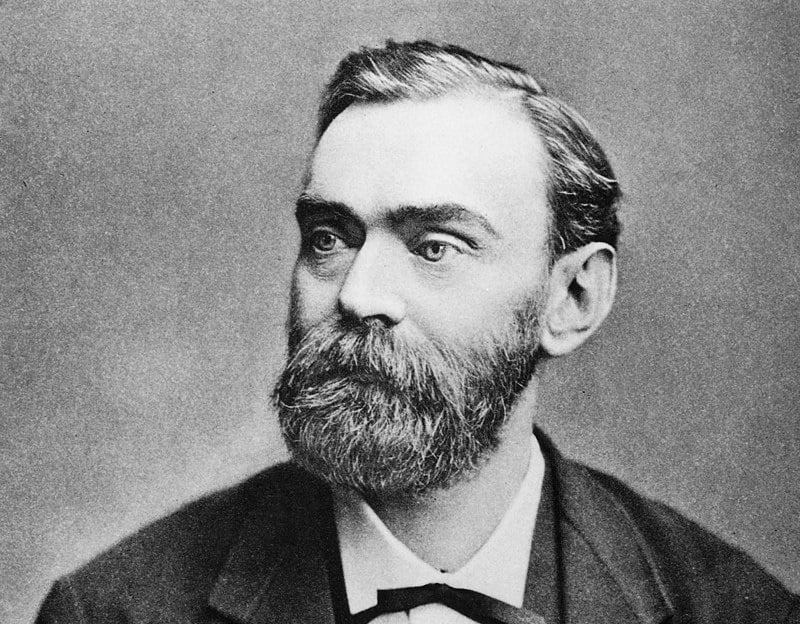According to a widespread legend, Alfred Nobel's decision not to establish a prize in mathematics was revenge for the fact that a representative of this discipline stole either his wife or fiancee from the Swede. We checked if this is true.
Supporters of the legend cite the following as the main argument: initially mathematics was included in the cherished list of areas for which prizes would be awarded. However, in will Nobel 1895 does not mention it:
“...The indicated percentages must be divided into five equal parts, which are intended: one part - to the one who makes the most important discovery or invention in the field of physics; the other - to the one who makes the most important discovery or improvement in the field of chemistry; the third - to the one who makes the most important discovery in the field of physiology or medicine; the fourth - to the one who creates the most outstanding literary work of an idealistic direction; fifth - to the one who has made the most significant contribution to the unity of nations, the abolition of slavery, or the reduction of existing armies and the promotion of peace congresses ... "
Most often, in connection with Nobel's decision not to include this discipline, the name of the famous Swedish mathematician Magnus Mittag-Leffler is mentioned. There are several versions of the reason for the deterioration of his relationship with Nobel. But the most popular one says that Mittag-Lefler allegedly stole Nobel’s wife or mistress. The first option is cut off immediately - Alfred Nobel was never married or engaged. As for the second, Nobel is known to be in love several times.
The Swede's first passion was the Russian girl Alexandra, but she refused his proposal. Some Russian-language sources mention instead a certain St. Petersburg resident Anna Desri, but her story is full of contradictions.
The second is Nobel's secretary, the Austrian Bertha Kinski, who is believed to have influenced Nobel's decision to establish the Peace Prize. However, she did this later, by correspondence, and before that she got married and ran away from Nobel, with whom, as far as we know, she was never in an intimate relationship. It is interesting that in the future the pacifist Bertha von Suttner (she took this last name after her wedding) will become one of the first peace prize winners.
And finally, the only woman with whom Alfred Nobel had a long-term relationship was young Sophie Hess from Vienna. They met and corresponded for 18 years (from 1876 to 1894). During this time, Sophie even managed to become pregnant, but not from Nobel and not from Mittag-Lefler, but from some Hungarian hussar. He was forced to resign and marry Hess, but disappeared almost immediately after the wedding, having managed to ask Nobel for money during this time. But there is no information about Magnus Mittag-Leffler’s acquaintance with Sophie Hess in available sources. Moreover, from 1882 until the end of his life, Mittag-Lefler was married to a completely different woman.

But did Nobel have other reasons for not wanting his fellow mathematician to ever receive a prize named after him? It is reliably known that Mittag-Leffler headed Stockholm University College (the future university) for some time and tried to convince Nobel, who lived in Paris, to mention this educational institution in his will. And although the college did appear in the first version of the will in 1883, it was no longer present in the final version of 1895. No one knows whether this was connected with Nobel’s personal relationship with Mittag-Leffler, but this fact could have influenced the birth of the legend about the Nobel Prize. But, as stated in interview Rossiyskaya Gazeta, executive director of the Nobel Foundation Mikael Sulman, “rather, mathematics was simply not part of Nobel’s sphere of interests. He bequeathed money for bonuses in areas close to him.”
What is the true reason for the non-inclusion of mathematics in the list of Nobel disciplines, we will most likely never know. But, apparently, there is no “female trace” in this story.
Not true
Read on topic:
1. https://www.nobelpeaceprize.org/History/Alfred-Nobel-s-will
4. https://cs.uwaterloo.ca/~alopez-o/math-faq/mathtext/node21.html
5. http://math.ku.sk/~tkacik/predmety/download/hm/prace/stateczna.pdf
If you find a spelling or grammatical error, please let us know by highlighting the error text and clicking Ctrl+Enter.







